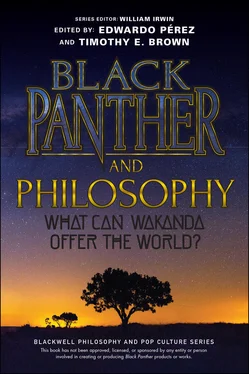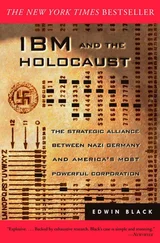Black Panther and Philosophy
Здесь есть возможность читать онлайн «Black Panther and Philosophy» — ознакомительный отрывок электронной книги совершенно бесплатно, а после прочтения отрывка купить полную версию. В некоторых случаях можно слушать аудио, скачать через торрент в формате fb2 и присутствует краткое содержание. Жанр: unrecognised, на английском языке. Описание произведения, (предисловие) а так же отзывы посетителей доступны на портале библиотеки ЛибКат.
- Название:Black Panther and Philosophy
- Автор:
- Жанр:
- Год:неизвестен
- ISBN:нет данных
- Рейтинг книги:4 / 5. Голосов: 1
-
Избранное:Добавить в избранное
- Отзывы:
-
Ваша оценка:
- 80
- 1
- 2
- 3
- 4
- 5
Black Panther and Philosophy: краткое содержание, описание и аннотация
Предлагаем к чтению аннотацию, описание, краткое содержание или предисловие (зависит от того, что написал сам автор книги «Black Panther and Philosophy»). Если вы не нашли необходимую информацию о книге — напишите в комментариях, мы постараемся отыскать её.
Black Panther and Philosophy: What Can Wakanda Offer The World
Black Panther
Black Panther and Philosophy
Black Panther and Philosophy — читать онлайн ознакомительный отрывок
Ниже представлен текст книги, разбитый по страницам. Система сохранения места последней прочитанной страницы, позволяет с удобством читать онлайн бесплатно книгу «Black Panther and Philosophy», без необходимости каждый раз заново искать на чём Вы остановились. Поставьте закладку, и сможете в любой момент перейти на страницу, на которой закончили чтение.
Интервал:
Закладка:
The reason for Burke’s opposition to revolution lies in how he thought that societies ought to grow and change. His early life had shown him that the bonds that hold societies together are far too complex for human reason to fully understand, so it is both foolish and immoral for anyone to think that reason alone can determine the form of government. Even if we have the best of intentions, we will cause unforeseen consequences when we use pure reason in order to change society and ignore traditions that have built up over a long time. As Burke writes, “ Men little think how immorally they act in rashly meddling with what they do not understand. Their delusive good intention is no sort of excuse for their presumption. They who truly mean well must be fearful of acting ill.” 1In other words, pure motives, good intentions, and clear reasoning do not justify us in carrying out revolutions.
And it doesn’t matter how intelligent the revolutionaries or their plans are. Even if we gathered together Reed Richards, Tony Stark, and Bruce Banner (three of the smartest people outside Wakanda) and asked them to carry out a revolution that set up a new, rationally based government in Wakanda, the result would be disastrous – and not only because the three of them are unlikely to agree about what the best society would be! Burke would say that not even three of the smartest people on earth could rationally design a system that would satisfy everyone. (Chances are, it would only satisfy people who already think like Reed, Tony, and Bruce.)
Instead of revolution – which tears down society as it is and erects something entirely new in its place – Burke preferred gradual, organic change that builds upon the parts of a society that already work well. “By preserving the method of nature in the conduct of the state,” he writes, “in what we improve we are never wholly new; in what we retain we are never wholly obsolete.” 2By following the example of nature, which always builds upon the world as it is rather than starting over with something brand new, we conserve what works in a society while also allowing for change that will be beneficial. This is the model of change that Burke thinks will truly improve societies.
So, if reason alone can’t show us how to govern or to change society, we must let the specific traditions and customs of our society help to guide us in ordering it. And reason can’t create a one-size-fits-all model of government for nations with different traditions (say, Wakanda, Attilan, and Latveria, for example). In a speech supporting American independence (a cause which Burke didn’t regard as a revolution since the Americans had spent centuries developing their own culture and society and just wanted to be left alone), Burke argued that a government must take into account the sentiments and character of its people in deciding how to govern them. Britain’s way of governing itself isn’t necessarily the right way to govern the American colonies. And, as he says in Observations on the Late State of the Nation , “ Politics ought to be adjusted not to human reasonings but to human nature, of which reason is but a part and by no means the greatest part.” 3In other words, a politics of reason alone attends to only one part of human nature, and such a politics will go wrong by ignoring people’s sentiments, traditions, and customs.
“Let the Challenge Begin”
Examples from Wakanda might show that Burke was right. The first Black Panther film establishes that Wakanda’s monarchy is semi-hereditary, with the oldest (probably male) members of the Panther Tribe being the first in line to rule. When T’Chaka dies in Captain America: Civil War , his son, T’Challa, inherits the throne, but who gets to be king is not decided merely by inheritance. Before T’Challa officially takes the throne, all of Wakanda’s tribes come together and have the chance to offer up a challenger for the throne. Any challengers must fight the presumptive king in ritual combat in order to earn the right to rule.
People from the industrialized West might look at this traditional way of transmitting power and say that it is irrational. Those who favor meritocracy or republicanism might say that being the son of a king does not give a man the right to rule. Moralists might object to the idea that mere physical strength makes a man fit to govern, saying that his moral character is far more important. Feminists might argue that patriarchy is poisonous for society and that Wakanda needs more women in power. Classical liberals would question the very idea of having a king at all, saying that monarchy itself is unjust and dangerous.
While each of these criticisms might have its merits, Burke would probably say that we make a mistake if we seek to throw out the “old ways” of Wakanda and create new ones built on reason alone. So if revolutionaries with aspirations to abstract ideas like liberty and equality suddenly seized power and abolished the Wakandan monarchy, the result wouldn’t necessarily be good. Even though they might seem irrational to outsiders like us, anyone can see from the Challenge Day scene in Black Panther that Wakanda’s traditions provide social cohesion that a purely rational system cannot possibly create. The reverence that the Wakandans have for their traditions tempers old tribal tensions and petty rivalries that might otherwise develop into social dysfunction or erupt into civil war. Dispensing with the traditions in one fell swoop would result in anything but liberty or equality.
We can see this most clearly when M’Baku arrives with representatives from the Jabari Tribe in order to challenge T’Challa for the throne. The people have gathered at the waterfall to witness their king’s coronation, members of each tribe dressed in their ceremonial finery to honor the solemnity of the event. Shuri, T’Challa’s brilliant but unorthodox sister, complains about her corset and asks if they can “wrap it up and go home.” Though she does not completely disregard the customs involved in the coronation, she does show a youthful irreverence that some might find scandalous. When M’Baku arrives with his men to challenge T’Challa, he complains that Wakanda’s “technological advancements have been overseen by a child … who scoffs at tradition!”
This scene sets up audiences to view M’Baku as one of the film’s antagonists (especially those of us who have read the comics). We might see Shuri as a representative of scientific and social progress and M’Baku as a remnant of an antiquated devotion to custom. But first appearances can be deceiving. Indeed, it is M’Baku’s reverence for tradition that allows for the peaceful transfer of power. When T’Challa defeats him in ritual combat, M’Baku yields and abandons his bid for the throne. A man with less reverence for tradition might use whatever means necessary to acquire power, starting a civil war.
In a paradoxical way, M’Baku’s commitment to the Challenge Day tradition with its underlying might-makes-right assumption could very well protect society from being subjected to something far more irrational. The ritual probably developed as a way to settle disputes between tribes that would cause open warfare and the domination of some tribes by others. By formalizing humanity’s old might-makes-right instinct, the Challenge Day ceremony turns it into a ritual that allows for the freedom and dignity of each tribe.
That doesn’t mean that the traditions surrounding the transfer of power in Wakanda can’t or shouldn’t change, of course. But Burke would argue that any change ought to happen organically and slowly. It would be perilous to suddenly abolish the tradition and replace it with a more “rational” means of transferring power.
Читать дальшеИнтервал:
Закладка:
Похожие книги на «Black Panther and Philosophy»
Представляем Вашему вниманию похожие книги на «Black Panther and Philosophy» списком для выбора. Мы отобрали схожую по названию и смыслу литературу в надежде предоставить читателям больше вариантов отыскать новые, интересные, ещё непрочитанные произведения.
Обсуждение, отзывы о книге «Black Panther and Philosophy» и просто собственные мнения читателей. Оставьте ваши комментарии, напишите, что Вы думаете о произведении, его смысле или главных героях. Укажите что конкретно понравилось, а что нет, и почему Вы так считаете.












